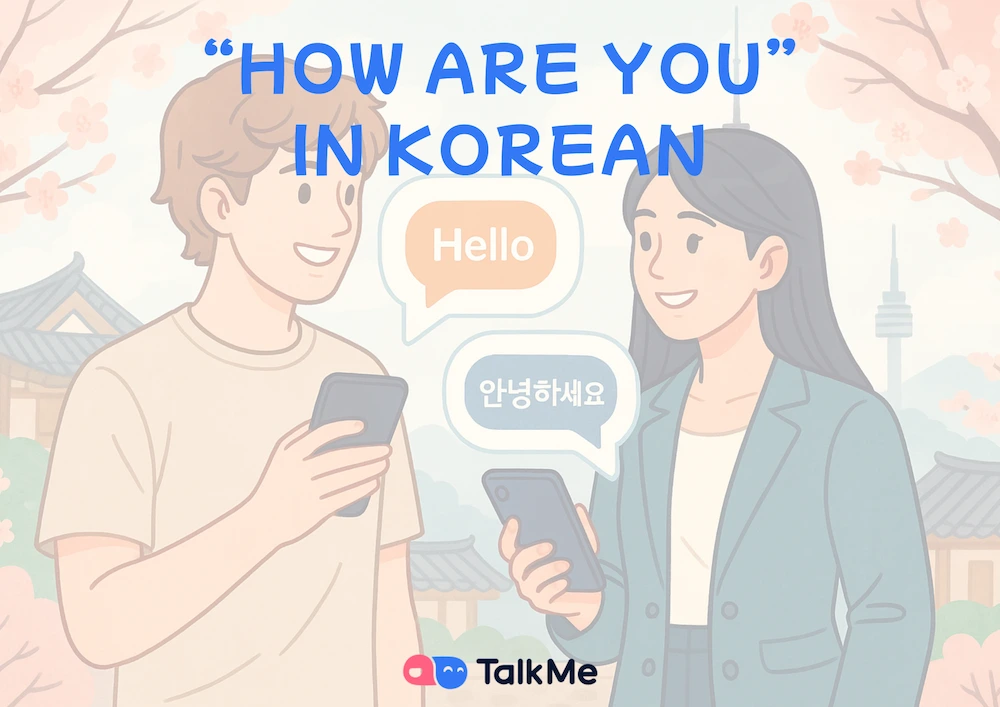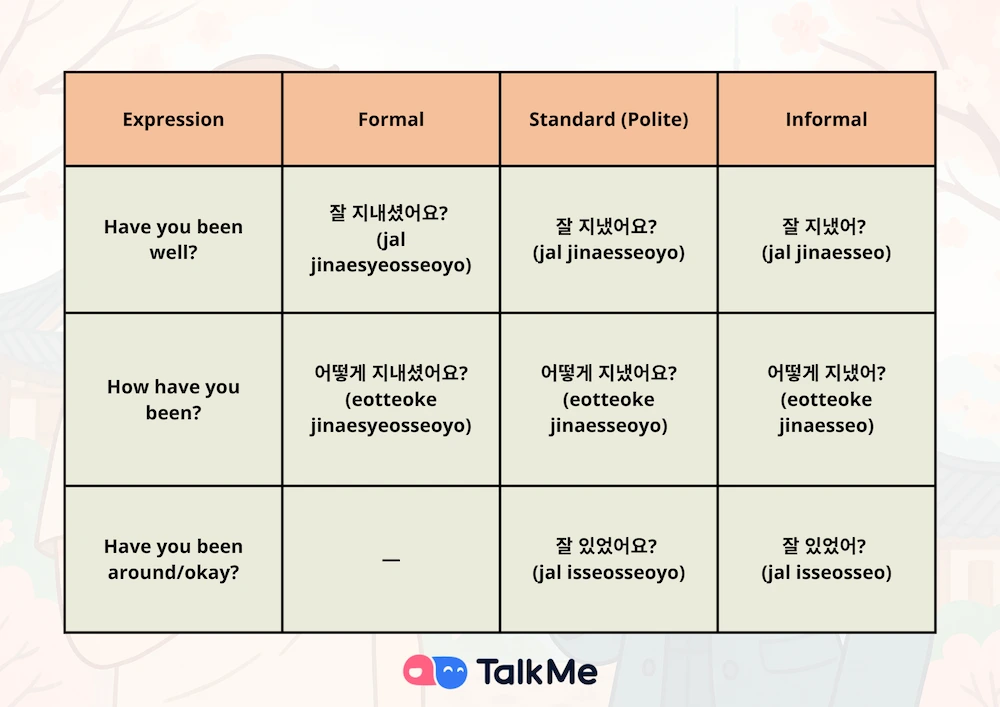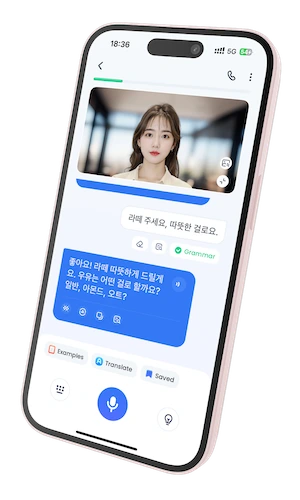How to Say “How Are You” in Korean (Formal & Informal)
Korean greetings are more than just polite small talk—they reflect deep cultural values like respect, hierarchy, and warmth. Saying “How are you in Korean” isn’t always straightforward because the language changes depending on who you’re speaking to. From elders and superiors to close friends, the way you greet someone in Korean varies based on formality and familiarity.
In this blog post, we’ll guide you through different ways to say “How are you?” in Korean, from formal to informal, so you can greet anyone appropriately. Whether you’re visiting Korea, chatting with Korean friends, or studying the language, mastering these expressions is key to sounding natural and respectful.

Understanding Korean Speech Levels
Before diving into the phrases, it’s important to understand that Korean speech levels are rooted in formality and social hierarchy. Who you’re talking to—whether it’s your boss, a stranger, or your childhood friend—determines how you speak.
Korean generally uses three main speech levels in daily conversations:
- Formal (존댓말 – jondaetmal): Used for elders, teachers, or strangers in professional or respectful settings.
- Polite/Standard (보통말 – botongmal): Common in everyday situations, especially with acquaintances or people of similar age.
- Informal (반말 – banmal): Reserved for close friends, younger people, or peers in casual settings.
These levels apply not just to greetings, but to the entire structure of the language. For example, if you’re wondering how to say “Are you OK?” in Korean, you’d use different forms depending on context:
- Formal: 괜찮으세요? (gwaenchanh-euseyo?)
- Informal: 괜찮아? (gwaenchanha?)
Now let’s learn how to greet someone with “How are you?” in Korean, beginning with the most formal versions.
Formal Ways to Say “How Are You” in Korean
When you’re speaking to someone older or in a higher position—like a professor, senior colleague, or your friend’s parents—you should use formal language.
Here are a few ways to say “how are you” in Korean formally:
- 잘 지내셨어요? (jal jinaesyeosseoyo?) – Have you been well?
This is a respectful and warm greeting that shows concern for someone’s wellbeing. - 어떻게 지내셨어요? (eotteoke jinaesyeosseoyo?) – How have you been?
Slightly more specific, this form asks how things have been going in their life.
Use these formal phrases in emails, interviews, or when meeting someone for the first time.
Standard (Polite) Ways to Say “How Are You”
The polite or standard form is the most versatile. It’s appropriate for most conversations, especially when you’re unsure of someone’s age or status.
Here are common expressions:
- 잘 지냈어요? (jal jinaesseoyo?) – Did you spend your time well?
Friendly and polite—perfect for casual colleagues, classmates, or neighbors. - 잘 있었어요? (jal isseosseoyo?) – Have you been doing well?
A slightly more formal variation focusing on someone’s well-being. - 어떻게 지냈어요? (eotteoke jinaesseoyo?) – How have you been doing?
More specific and conversational, often used after not seeing someone for a while.
These expressions also work well when saying, “Hello, how are you in Korean?”—a great way to open conversations naturally.

Informal Ways to Say “How Are You”
When speaking with close friends, younger siblings, or someone you’re on casual terms with, it’s safe to use informal Korean. This speech level is friendly, relaxed, and often used in texting or between peers.
Here are the informal versions:
- 잘 지냈어? (jal jinaesseo?) – Have you been well?
Simple and commonly used among friends. - 잘 있었어? (jal isseosseo?) – Have you been okay?
A caring, friendly tone that fits everyday chats. - 어떻게 지냈어? (eotteoke jinaesseo?) – How have things been for you?
This one shows curiosity and interest in the person’s recent experiences.
Use informal speech carefully. If you’re not sure whether it’s okay, default to the standard polite form to be safe.
Bonus: “Have You Eaten?” as a Greeting
In Korean culture, asking someone if they’ve eaten is a loving and familiar way to show you care. That’s why you’ll often hear:
- 밥 먹었어요? (bap meogeosseoyo?) – Have you eaten?
This phrase goes beyond just food—it’s a traditional way of asking how someone is doing, especially among family and close friends. It’s similar to “how are you doing” Korean-style, but with a cultural twist.
If someone asks you this, they’re likely checking in on your well-being and comfort. You can reply with:
- 네, 먹었어요! (ne, meogeosseoyo!) – Yes, I ate!
- 아직이요. (ajigiyo) – Not yet.
TalkMe AI: Best AI Tutor for Learning Korean
Want to practice all these phrases naturally? Meet TalkMe AI, your personal AI language tutor that helps you learn Korean the smart way.

Con TalkMe AI, puedes:
- Perfect your pronunciation using real-time voice feedback
Master speech levels, so you never mix up formal and informal again - Practice Korean greetings and conversations with realistic, AI-generated dialogues
- Correct your grammar and get helpful hints when you make mistakes
- Instantly translate or understand context with one tap
From asking “how are you in Korean word” to full conversations about your day, TalkMe AI makes learning smooth and enjoyable. Whether you’re a beginner or an intermediate speaker, it adapts to your pace and gives you real-life experience through:
- 🗣️ Real-life roleplay
- 📘 Instant grammar correction
- 🔄 Automatic translation support
Start speaking confidently today. Try TalkMe AI and see how fast your Korean improves!
Downloadable Resources & Practice Tips
To help you practice, we’ve created a free downloadable PDF guide:
“How Are You in Korean – Cheat Sheet”
This guide includes:
- All the formal, standard, and informal expressions
- Example dialogues for each speech level
- Quick pronunciation tips
Practice Tips:
- Use TalkMe AI’s speaking mode to rehearse with an AI tutor
- Watch Korean dramas and try to identify which form of “How are you?” they use
- Listen to K-pop interviews or variety shows for natural expressions
- Try shadowing—repeat after native speakers to mimic their tone and rhythm
Recommended Video: “Top 10 Korean Greetings You Should Know” (Available inside TalkMe AI’s learning hub)
Take Home
Now you know how to say “How are you?” in Korean—in formal, polite, and casual settings. Remember, the key to sounding natural in Korean is not just memorizing words, but choosing the right level of formality for each situation.
Whether you’re saying 잘 지내셨어요? to your boss, or 잘 지냈어? to your friend, small differences make a big impact in Korean culture.
Want to take your Korean to the next level?
Practice naturally with TalkMe AI—your smart companion for real-life Korean learning.
Download the app now and say “안녕하세요, 잘 지내셨어요?” like a native speaker!
